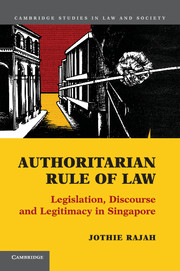Book contents
- Frontmatter
- Contents
- An Insider’s Preface on ‘Rule of Law’ Confusions
- Acknowledgements
- 1 Law, Illiberalism and the Singapore Case
- 2 Law as Discourse
- 3 Punishing Bodies, Securing the Nation
- 4 Policing the Press
- 5 Policing Lawyers, Constraining Citizenship
- 6 Policing Religion
- 7 Entrenching Illiberalism
- 8 Legislation, Illiberalism and Legitimacy
- Bibliography
- Index
- References
8 - Legislation, Illiberalism and Legitimacy
Published online by Cambridge University Press: 05 June 2012
- Frontmatter
- Contents
- An Insider’s Preface on ‘Rule of Law’ Confusions
- Acknowledgements
- 1 Law, Illiberalism and the Singapore Case
- 2 Law as Discourse
- 3 Punishing Bodies, Securing the Nation
- 4 Policing the Press
- 5 Policing Lawyers, Constraining Citizenship
- 6 Policing Religion
- 7 Entrenching Illiberalism
- 8 Legislation, Illiberalism and Legitimacy
- Bibliography
- Index
- References
Summary
This project has traced the Singapore state’s reconfiguration of the profoundly liberal concept of the ‘rule of law’ into an illiberal ‘rule by law’ through the state’s manipulation of legislation and public discourse. In tracing this process, I have asked: How does the Singapore state maintain its legitimacy as a ‘rule of law’ polity despite its ‘rule by law’ practices? In this concluding chapter, I revisit the specific legislative moments detailed from Chapters 3 to 7 to derive a whole that is greater than its parts: a template for ‘law’ that facilitates and engenders state legitimacy for ‘rule by law’.
The case studies have illustrated how the state tries to make ‘law’ Singapore-specific through arguments of exceptionalism and the trope of Singapore’s perpetual territorial vulnerability. As a preface to the template for ‘rule by law’ legitimacy offered here and in keeping with the methodological focus on discourse, I first analyse a significant exchange between the International Bar Association Human Rights Institute (Ibahri) and the state. This exchange demonstrates that no matter how much the state’s discourse of Singapore exceptionalism has tried to fence off ‘law’ as ‘local’, as concept and category, the ‘rule of law’ is inexorably global. In this global resonance, there is the implication that the remaining challenges to the legitimacy of the PAP state, and possibilities for a resurgence in the ‘rule of law’ within Singapore, lie externally.
- Type
- Chapter
- Information
- Authoritarian Rule of LawLegislation, Discourse and Legitimacy in Singapore, pp. 267 - 298Publisher: Cambridge University PressPrint publication year: 2012



